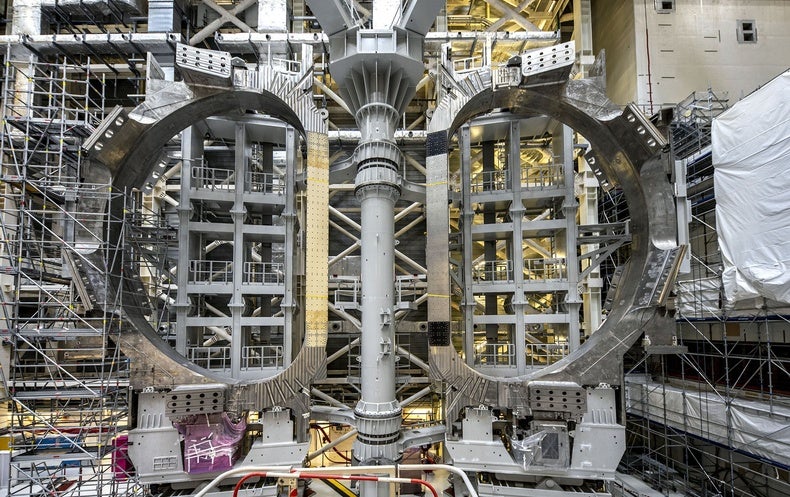- cross-posted to:
- science

It’s not like building a hydroelectric dam, this is stuff on the edge of science, so of course you can’t get an accurate budget or timeline estimate. The 10 years was probably to placate governments and fundraiser members.

Honestly, going wildly over budget is pretty much par for the course in any sort of large scale infrastructure project in Europe. With the way tender procedure’s work in the EU, it’s entirely expected that things are going to end up being more expensive and take twice as long. It’s stupid and wasteful, but it’s “public money” and not going to change any time soon.

ITER isn’t a EU but international project and was never meant to be cheap: If you want something to be cheap you don’t ask ten different companies in ten different countries to produce one coil each.
Doing it that way was a political decision, it’s about technology transfer, building knowledge in different countries, not building a cost-efficient reactor.
You can build more complex stuff much cheaper, e.g. the Wendelstein 7x project costs 1.3bn, and that’s including all wages for the general Max Plank outpost in Greifswald for 18 years. The reactor itself did cost 370m. It’s way smaller than ITER, yes, but have a look at the Lovecraftian geometry and you see why it’s just a tad harder to build.

It’s not an EU project, but there are EU countries involved in the funding, which means EU tender regulations apply.
Wendelstein is cheaper, but according to wikipedia it also went over budget. “[…] while the total cost for the IPP site in Greifswald including investment plus operating costs (personnel and material resources) amounted to €1.06 billion for that 18-year period. This exceeded the original budget estimate, mainly because the initial development phase was longer than expected, doubling the personnel costs.” (The original source is a dead link, but you could probably find something corroborating fairly easily.)
I’m not saying ITER is a bad project, I don’t even think the cost is a problem, I just think that the regulations surrounding the financing of these kinds of projects often do more harm than good.

This effect is present not only in infrastructure projects, but all other type of projects, including personal ones. Any project that involves doing something completely new (to you or in general) will most likely take more time than, initially estimated.

With a project like that it’s simply impossible to estimate how long it’s going to take and what is going to cost because you don’t really have a clear idea of what you’re going to do in the first place.

If you look at this chart from the article the delays actually look pretty reasonable and you can see them closing in on completion. Looks like been a series of set backs in the recent past with particular components but I think a budget comparable to the Manhattan Project (as the article states) is probably pretty reasonable for a project like this. In fact I was pretty surprised it was that small.


Yeah, this really doesn’t look even remotely surprising to me.
Absolutely everyone involved should already understand that they are not building something that they know how to build.
Sure, they have plans, and they can build to exactly those plans… But even then, there is no guarantee at all that they will then achieve net positive fusion energy. Because nobody has done that in a controlled reaction.
But it’s also not like the rest of the world is sitting still. Other projects exist, and sometimes those projects are going to learn things that will impact the design of ITER.
For that matter, even if they have the plans, some of the pieces are things that nobody has ever built on that scale before, which means that nobody really knows how to build them until they try.
This is a really good example of a project that you can not accurately estimate.

Well, science is expensive. Even more so if you want to combine it with a metric buttload of technology transfer.

Seems like the way to make energy out of fusion would be to burn the budgeted cash instead in a conventional furnace.

So, thus far, the cost of ITER is less than the Manhattan project, but it has taken longer. The adage that it is easier to destroy than to create comes to mind.
It does seem like ITER could be more transparent, but the article is overly hyperbolic about one of the most important civil works going over time and budget.
America has spent 5x the ITER budget on Ukraine so far (and rightly so). I wish we lived in a world where that money could have supported research projects like this instead.

People say that fusion will use very cheap and harmless fuel to generate energy. But practically the real fuel will be all the replacement parts that will be constantly degraded and used up to maintain it’s operation.

That’s true if of any power plant though. It’ll still be cheaper and safer (if it ever works).

I was under impression that for tokomak fusion the enclosure have to be so precisely manufactured that any minor damage requires replacement. If so, then maintenance will be way more expensive than regular power plants.

I think you’re making quite a big leap with that statement with very little to back it up. Once (if) a working Fusion reactor design is finalised, then manufacturing will ramp up and the quality of those components will only improve. Until we have that final design though, it’s impossible to make claims about how expensive maintenance will be.

Most likelye this budget was “calculated” for politics and for all parties involved it is known, except for the tax payers, who might block the project (read - be unhappy) if the real cost would have been known beforehand.

Practical engineering did a great video on why this happens.

